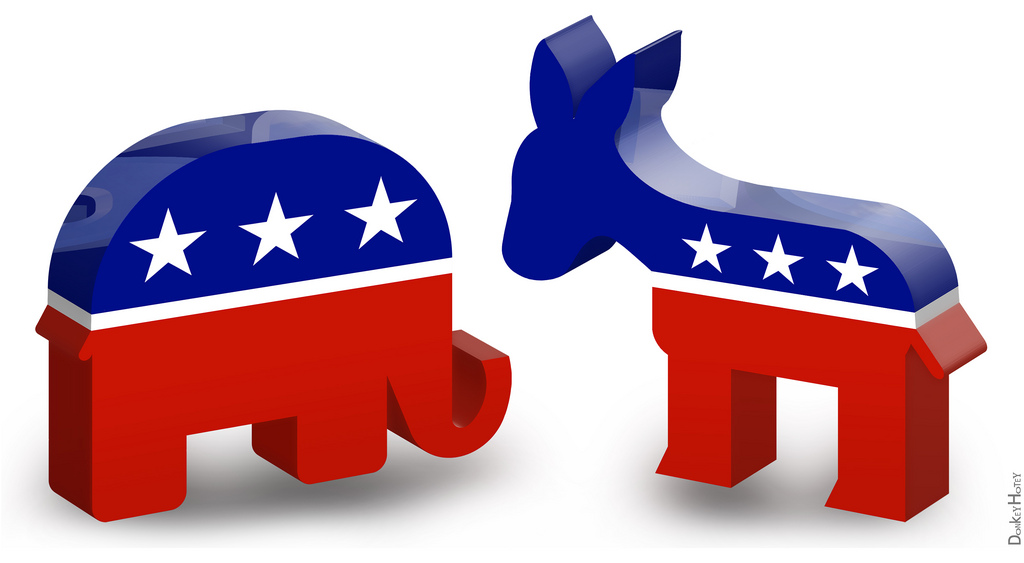
LAS VEGAS — The Republican presidential debates have become appointment television. Tens of millions of Americans have tuned in to watch Donald Trump whack his unwieldy field of opponents — pooh-poohing Jeb Bush’s energy level, for example, or disparaging Rand Paul’s appearance.
So, what happens if the biggest fireworks in the first Democratic debate here Tuesday night are over which candidates opposed the Keystone XL pipeline first, which would resurrect the Glass-Steagall banking act, or how each would pay for his or her higher-
education overhauls?
Democrats expect the debate to be substantive and to set the course for an unexpectedly contentious nominating contest. Americans are either going to find a pleasing contrast to the rip-roaring show Republicans have put on — or they’re going to be bored senseless.
“Let’s be honest: Donald Trump truly is a ratings machine. Twenty-three million people did not tune in to see Marco Rubio,” said Paul Begala, a Democratic strategist and an analyst on CNN, which is airing Tuesday’s debate. “So, unless the Democrats can talk one of the Kardashians into running, don’t expect the Democrats’ ratings to approach the Republicans’.”
For better or worse, Republicans have engaged a massive swath of the country with their first two debates, which were watched by 25 million and 23 million people, respectively. (By comparison, the highest-rated Democratic presidential debate in 2008, when Barack Obama and Hillary Rodham Clinton were locked in a battle royal, drew 10.7 million viewers.) Even if some voters tuned in just to witness the spectacle that is Trump’s front-running candidacy, they now are familiar with many of the other GOP candidates.
 Sen. Bernie Sanders (I-Vt.) prepares to speak at Benedict College in Columbia, S.C., on Sept. 12. (Melina Mara/The Washington Post)
Sen. Bernie Sanders (I-Vt.) prepares to speak at Benedict College in Columbia, S.C., on Sept. 12. (Melina Mara/The Washington Post)A test for Democrats is whether Clinton, a former secretary of state and first lady, and a cast of four challengers, led by liberal insurgent Sen. Bernie Sanders (I-Vt.), can generate the same level of interest in their primary campaign.
[Bernie Sanders prepares for his national-debate stage debut]
In the run-up to Tuesday’s debate, there are signs that they could. On Sunday, there were 124,812 mentions of the Democratic candidates on social media, television and in newspapers. By comparison, there were 377,223 mentions of the Republican candidates two days out from their Sept. 16 debate, according to an analysis by Zignal Labs, The Washington Post’s analytics partner.
But the Republican statistic is larger in part because it included many more candidates and came on a Monday, which tends to have more traffic than a Sunday. Generally, Clinton and Sanders have larger social-media presences than any GOP candidate other than Trump, according to Zignal.
“More people are talking about the Democrats than about the Republicans, outside of Trump,” said Josh Ginsberg, Zignal’s co-founder and chief executive. “The Clinton-Sanders horse race is interesting to people.”
As they prepare for their first face-off, Clinton and Sanders have signaled that they will wear velvet gloves. Each plans to focus on his or her own policy proposals and backgrounds, drawing comparisons with each other wherever appropriate but avoiding the kind of direct, personal attacks that have been so prominent in the Republican race.
None of the Democratic candidates is Trump’s equal in bombast and showmanship. And unlike many of the Republican candidates, the Democrats are downright predictable.
 Republican presidential candidates Donald Trump and Jeb Bush talk over each other in the second GOP presidential debate on Sept. 16. (Mark J. Terrill/AP)
Republican presidential candidates Donald Trump and Jeb Bush talk over each other in the second GOP presidential debate on Sept. 16. (Mark J. Terrill/AP)Sanders will probably bring the most passion, as he has all summer and fall while drawing massive crowds across the country. Clinton, who earned a reputation as a steady and skilled debater in her 2008 campaign, is by her nature cautious and is likely to display more competence than entertainment value.
Two lesser-known candidates, former senator Jim Webb of Virginia and former governor and senator Lincoln Chafee of Rhode Island, tend to be understated.
“The level of humility and seriousness in this debate will be stark compared to what has been happening in the Republican debates, and that’s a good thing for our party,” said Stephanie Cutter, a Democratic strategist and veteran of President Obama’s campaigns.
The wild card could be former Maryland governor Martin O’Malley, who is struggling to break out of the low single digits in polls and sees the fall debates as make-or-break opportunities. On the campaign trail, he has fired shots at Clinton, and he could do so on the debate stage.



Expositores: Oscar Vidarte (PUCP) Fernando González Vigil (Universidad del Pacífico) Inscripciones aquí. Leer más
Una retrospectiva para entender los próximos cuatro años. Leer más
En la conferencia se hará una presentación de los temas más relevantes del proceso de negociación se llevó a cabo desde el 2012, así como del acuerdo de paz firmado entre el Gobierno colombiano y la guerrilla de las FARC a finales del 2016. Se analizarán los desafíos y las... Leer más
El Observatorio de las Relaciones Peruano-Norteamericanas (ORPN) de la Universidad del Pacífico es un programa encargado de analizar y difundir información relevante sobre la situación política, económica y social de Estados Unidos y analizar, desde una perspectiva multidisciplinaria, su efecto en las relaciones bilaterales con el Perú.
© 2026 Universidad del Pacífico - Departamento Académico de Humanidades. Todos los derechos reservados.

